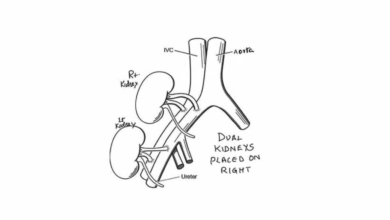12 signs from your body that you should never ignore
In India, we often overlook our body’s symptoms and hesitate to report them to a doctor unless we believe they are severe. However, we have compiled a list of 12 symptoms you should not ignore; they are your body’s way of telling that you need medical help.
1. Sudden symptoms
A. Slurred speech
Symptoms like slurred speech may point to a serious condition, says Dr Roohi Pirzada, senior hysician and critical care specialist from Mumbai.
She explains that it can be a symptom of an ongoing haemorrhagic stroke. It can also mean metabolic syndrome conditions like:
- Low sodium levels (hyponatremia)
- Low blood sugar (hypoglycemia)
- Liver-related brain issues (hepatic encephalopathy)
- High ammonia levels in the blood (hyperammonemia)
- Viral brain infections (viral encephalopathy)
- Bacterial infections can cause swelling around the brain and spinal cord (infectious meningitis).
“These symptoms should be taken as an emergency in which the individual can go into an irreversible condition with disabilities,” she says.
B. Change in mental status
Now, when we talk about a sudden change in mental condition, it means experiencing symptoms like confusion or disorientation which may signal various neurological emergencies, including stroke, traumatic brain injury, severe infection, or metabolic imbalance, explains Dr Vandana Boobna, associate director of internal medicine at Max Super Speciality Hospital, Shalimar Bagh, New Delhi.
C. Flashes of light and increased floaters
- Experiencing “flashes of light” means seeing brief, spark-like flashes in your vision.
- These flashes can occur in one or both eyes and may appear as jagged lines or as a sudden burst of light.
- On the other hand, “increased floaters” refer to the perception of more spots, squiggles, or thread-like strands drifting across your field of vision.
- Both conditions can be serious, according to Dr Rajeev Gupta, director, internal medicine, CK Birla Hospital, Delhi.
“These visual disturbances could be indicative of retinal detachment (a thin layer of tissue (the retina) at the back of the eye pulls away from its normal position) or a tear in your retina, a condition requiring prompt medical evaluation,” says Dr Gupta.
D. Chest pain
India is seeing a steady hike in heart-related cases.
According to the National Crime Records Bureau (NCRB), there was a 12.5 per cent increase in heart attack cases in 2022, with over 32,457 people dying from heart attacks in that year.
Dr Sunil Dwivedi, consultant cardiologist from Manipal Hospital, Millers Road in Bangalore, clarifies that not every kind of chest pain can be a sign of worry.
For instance, he says that sudden chest pain can radiate from the jaw to the navel alongside a burning sensation or heaviness in the chest, sometimes extending to the right or left hand.
“Such sudden chest pain should raise concern about an underlying heart issue, heart attack, or sudden cardiac arrest,” adds Dr Dwivedi.
He further adds that, on the other hand, pain confined to very small areas usually does not indicate a heart attack.
“This pain goes away within seconds or gets exacerbated by movements like turning, bending, or coughing. These types of pain may occur due to various other reasons,” he says.
2. Unexplained symptoms
A. Weight loss
If you are losing weight a little too much, a little too fast, be cautious.
“Unexplained weight loss should never be ignored. A significant weight loss is said to be if you have lost more than 4.5 kg in six months (without working out),” says Dr Manira Dhasmana, associate consultant, department of internal medicine, Max Healthcare, Dehradun.
Dr Boobna also agrees and further says that unintentional weight loss could signal underlying health problems like thyroid disorders, disorders, diabetes, gastrointestinal diseases, or even cancer.
B. Blood in your urine or stool
Both the experts; Dr Gupta and Dr Boobna, agree and say that blood in your urine or stool could be indicative of gastrointestinal bleeding, urinary tract infections, or more serious conditions like colorectal cancer.
C. Shortness of breath
If you’re suffering from shortness of breath, according to experts, it is important to take action during the first time itself.
For instance, Dr Dwivedi, explains that sudden and severe breathlessness signals serious conditions such as:
- Lung infections
- Pneumonia
- Pneumothorax
- Heart failure
However, according to him, chronic or slowly developing breathlessness can also be due to heart failure, old lung problems, new lung problems, muscle fatigue or anaemia, or even kidney failure.
3. Persistent Symptoms
ADVERTISEMENT
A. Hoarse voice or coughing
Dr Gupta explains that a hoarse voice or coughing is no big deal if you have had it once. However, if you have persistent hoarseness or coughing, it could be indicative of:
- Respiratory infections
- Allergies
- Even throat cancer
B. Loud Snoring
Do you also know someone who snores so loudly that no one else can sleep next to them? Well, their snoring might be a sign of something more. Dr Gupta says that while snoring is common, excessively loud or disruptive snoring may indicate obstructive sleep apnoea, a condition that can lead to serious health complications.
Dr Dwivedi agrees and says that if loud snoring is recent, it can indicate a “pretty unhealthy status, and it needs to be diagnosed and treated”.
“It indicates compromised airways during sleep and causes low oxygen levels and tremendous sympathetic stress on the heart which can lead to high BP, heart failure, worsening of diabetes, and heart attacks,” says Dr Dwivedi.
C. Overwhelming fatigue
Feeling tired is very common and, often at times, taking a break (the right kind) might help you with it. However, if you are facing overwhelming fatigue and it is interfering with your daily activities, then according to Dr Gupta, it may be a sign of underlying medical conditions such as anaemia, thyroid disorders, or depression.
4. Strange Symptoms
Dr Boobna says that you experience strange symptoms because of some underlying conditions. For instance, if you’re feeling:
A. Excessive thirst
Experiencing persistent and excessive thirst, according to Dr Boobna could be a sign of various conditions such as:
- Diabetes
- Dehydration
- Certain hormonal imbalances.
“Ignoring excessive thirst may lead to dehydration, electrolyte imbalances, or complications related to untreated diabetes,” she adds.
B. Itchy, tingling lips and throat
Dr Gupta says that if you’re experiencing itchiness and tingling in your lips and throat, it could indicate allergic reactions, “ranging from mild to severe allergic reaction, which indicates direct medical attention”.
Remember
If you suffer from any of these 12 symptoms, seeking timely medical advice can significantly impact the early detection and treatment of potential health issues.
Ignoring these warning signs may lead to complications or delays in addressing underlying conditions.
Remember, your body often communicates its needs through symptoms – listen attentively and prioritise your health and well-being.








